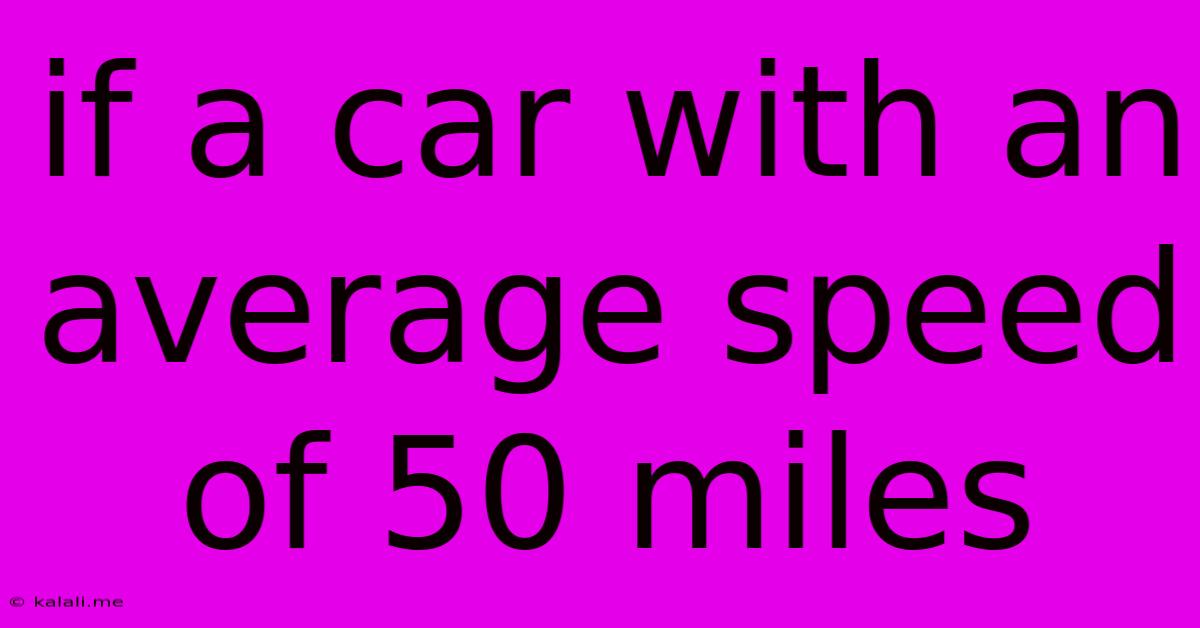If A Car With An Average Speed Of 50 Miles
Kalali
Jun 14, 2025 · 3 min read

Table of Contents
If a Car Travels at an Average Speed of 50 Miles Per Hour...
Meta Description: Discover how average speed impacts travel time and distance covered. We explore the relationship between speed, distance, and time, providing examples and calculations for a car averaging 50 mph. Learn how to calculate travel times and distances based on average speed.
If a car travels at an average speed of 50 miles per hour (mph), it means that, on average, it covers a distance of 50 miles in one hour. This seemingly simple statement opens the door to understanding a fundamental concept in physics and practical applications in everyday life, particularly when planning road trips or estimating travel times. Let's delve deeper into what this average speed implies and how we can utilize this information.
Understanding Average Speed
Average speed is a crucial concept in physics. Unlike instantaneous speed (the speed at a specific moment), average speed considers the total distance covered over a specific time period. It's calculated by dividing the total distance traveled by the total time taken. The formula is:
Average Speed = Total Distance / Total Time
Calculating Travel Time
Knowing the average speed allows us to easily calculate the travel time for a given distance. Let's say you're planning a trip of 200 miles and your car maintains an average speed of 50 mph. Using the formula, we can rearrange it to solve for time:
Total Time = Total Distance / Average Speed
Therefore:
Total Time = 200 miles / 50 mph = 4 hours
This means the journey will take approximately 4 hours, assuming consistent average speed. However, it's important to remember that this is an estimate. Real-world driving conditions rarely allow for perfectly consistent speeds due to traffic, stops, and varying terrain.
Calculating Distance Traveled
Conversely, if we know the travel time and the average speed, we can calculate the distance covered. Imagine you drive for 2.5 hours at an average speed of 50 mph. The distance covered would be:
Total Distance = Average Speed x Total Time
Therefore:
Total Distance = 50 mph x 2.5 hours = 125 miles
Factors Affecting Average Speed
Several factors can significantly influence a car's average speed. These include:
- Traffic Congestion: Heavy traffic can drastically reduce average speed, leading to longer travel times.
- Road Conditions: Poor road conditions, such as construction zones or potholes, can necessitate slower speeds.
- Terrain: Hilly or mountainous terrain will generally decrease average speed compared to flat roads.
- Weather Conditions: Adverse weather such as rain, snow, or fog can significantly impact driving speed and safety.
- Driver Behavior: Aggressive driving or frequent stops increase travel time and reduce average speed.
Real-World Applications
Understanding average speed has various practical uses:
- Trip Planning: Accurately estimating travel times for road trips and making necessary adjustments for rest stops.
- Fuel Consumption: Average speed can indirectly impact fuel efficiency, as higher speeds generally consume more fuel.
- Logistics and Delivery: Companies use average speed calculations for optimizing delivery routes and estimating delivery times.
In conclusion, while a car averaging 50 mph provides a baseline for calculating travel time and distance, it's crucial to account for real-world factors that can influence actual travel times. By understanding the relationship between speed, distance, and time, and considering the variables that affect average speed, we can make more accurate travel estimations and better plan our journeys.
Latest Posts
Latest Posts
-
Difference Between High Pass Filter And Low Pass Filter
Jun 15, 2025
-
Differentiate Between Monohybrid Cross And Dihybrid Cross
Jun 15, 2025
-
Which Of The Following Are True About Language
Jun 15, 2025
-
Select Whats True About Object Oriented Databases
Jun 15, 2025
-
Number Of Valence Electrons In Chlorine Ion Are
Jun 15, 2025
Related Post
Thank you for visiting our website which covers about If A Car With An Average Speed Of 50 Miles . We hope the information provided has been useful to you. Feel free to contact us if you have any questions or need further assistance. See you next time and don't miss to bookmark.